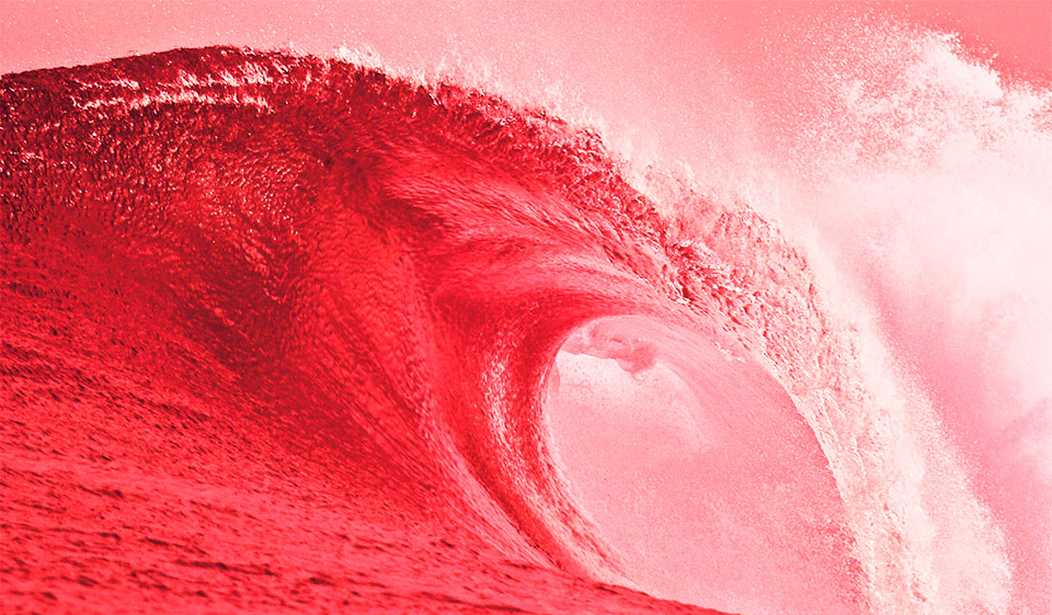For months, the Republican Party had a decent lead in the generic ballot, but after the Supreme Court’s ruling in Dobbs v. Jackson Women’s Health Organization, polls tightened. But now, they’re all over the place, and the mainstream media is doing its best to tamp down talk of a red wave in November.
“Last fall, Republicans held high hopes of a ‘red wave’ in the 2022 elections after they stormed to power in blue-leaning Virginia and nearly won the governor’s race in New Jersey. While Democrats were demotivated, the GOP base was on fire,” NBC News reported last week. “But in recent weeks, numerous data points have indicated Republican prospects of a smashing victory are dimming. While the president’s party tends to perform poorly in midterm elections, there are signs it is shaping up to be an unusual year, potentially enabling Democrats to hold one or both chambers of Congress.”
The Hill joined in on poo-pooing a red wave. “Republican worries of a midterm flop are growing heading into the critical post-Labor Day campaign season, with analysts who had previously predicted massive GOP gains shifting their forecasts toward Democrats,” the paper reported, citing Republican strategist Rick Tyler, who insists the political environment looks “not even close” to a red wave election year.
“The enthusiasm is just not there,” Tyler said. “Last time Republicans had a good year, they were 6 points ahead in the generic poll. Now we’re barely 2 points ahead. So it’s definitely not going to happen.”
It’s probably worth mentioning here that Tyler is a political analyst for MSNBC.
But, is this really a tight election season on the generic ballot? Sure, the RealClearPolitics average shows things are very tight, but that’s because we have some polls showing Democrats up 4 points or 5 points, and even one suggesting Democrats are up 8 points—and we also have polls showing Republicans up 5 points and 6 points. These polls are all over the place, and while I can’t say for sure there aren’t some suppression polls in the mix, I dare say it’s a possibility. There’s a reason why people often dismiss polls from biased media outlets or internal campaign polling. Heck, in NY-23, Carl Paladino released an internal poll showing him up 30 points over his primary opponent Nick Langworthy—yet Langworthy would go on to beat Paladino by several points. Was Paladino’s poll a suppression poll or just garbage?
Honestly, I can’t answer that question. All I can say is that not all polling is created equal, and because of that, it’s hard to know what polls are trustworthy. I like looking at poll averages, but there are definitely certain pollsters I trust more than others. One that quickly earned my respect is the Trafalgar Group. When most polls predicted Hillary Clinton to win in 2016, the Trafalgar Group correctly predicted Trump’s victory and 306 electoral votes. The Trafalgar Group’s latest generic ballot poll gives Republicans a six-point lead, which is up one point from their previous poll, which had been down three points a month earlier. That’s despite a nearly 4-point Democratic edge in participation. Based on their polling, the generic ballot is swinging back in favor of the GOP already, and it’s only early September.
But, what separates the Trafalgar Group’s polling from the polling of its competitors? Short questionnaires.
“We really believe that one of the most fundamental flaws in public polling is long questionnaires,” Robert Cahaly, the senior strategist and founder of the Trafalgar Group, explained to PJ Media last month. “The number one question we get is, ‘How long is this going to take?’” he explained. “And if you say something other than just two or three minutes…average people with real lives and real stuff to do, they hang up the phone.”
It’s true that the dynamics of the midterm elections changed a bit after Dobbs, but in the end, abortion isn’t the most important issue to the voters. Ultimately, the economy is still suffering under Joe Biden, we’re in a recession, and inflation and high gas prices are squeezing the budgets of millions of families. Voters trust Republicans to solve those problems more than Democrats.
So, filter out the noise of the liberal media, and don’t let it suppress your vote in November. A red wave depends on you, not a liberal network’s poll.










